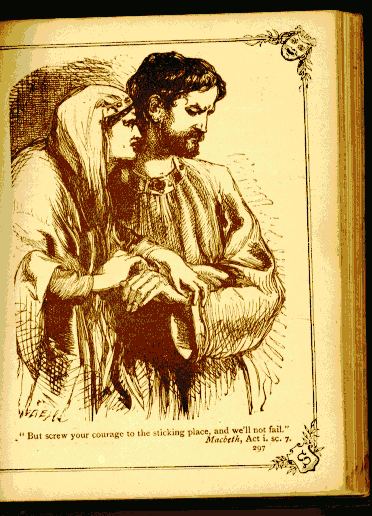Macbeth
Today, Shakespeare tells us how to stay sane. The University of Houston's College of Engineering presents this series about the machines that make our civilization run, and the people whose ingenuity created them.
I saw Macbeth again last night. How many Macbeths have I seen? A dozen maybe? When I was at Fort Monmouth in 1954, the troops did Macbeth in pastel-dyed fatigues and combat boots. In the '70s, Playboy magazine produced a movie version -- a tad more graphic than most, but still a pretty good rendering. I've seen Verdi's opera version and Toshiro Mifune as a samurai Macbeth in the great Japanese movie, Throne of Blood.
Macbeth is an odd play about the common denominator of madness. It's what we engineers like to call robust. Robust designs stand up when you do unexpected things to them and with them.
Last night's open air production, given free of charge in a city park, stood up to summer heat and held its audience of thousands. These weren't theater cognoscenti but, rather, a perfect cross-section of Houston. I'm sure many of the people there would've had trouble paying for an expensive pro-basketball ticket.
And the audience sat riveted until MacDuff, who'd been from his mother's womb untimely ripped, finally dispatched the half-mad Macbeth. And last night, as always, I left the theater wondering whether Macbeth had been killed by MacDuff or by his own guilt.
It was a curious experience. I felt a thrill of surprise as Macbeth left the witches to find he'd been named Thane of Cawdor. Of course I knew perfectly well the man entering from stage right would tell him that. Yet Shakespeare manages to summon a willing suspension of prior knowledge.
Things I noticed for the first time emerged from the well-worn script. They always do. This time, it was a physician telling Macbeth that his wife "is troubled by thick-coming fancies that keep her from her rest." "Cure her of that," cries Macbeth. "Cans't thou not minister to a mind diseas'd; Pluck from memory a rooted sorrow ..." The physician replies, "Therein the patient must minister to himself."
Shakespeare is saying just what modern psychotherapists tell patients -- that they must ultimately minister to themselves. His physician reminded us that Macbeth is a play entirely about the dark forces of the human mind. Are those witches real, or did Macbeth dream them up in the first flush of battlefield success? Is there anything that so threatens our mental health as sudden success? (God deliver me from ever winning the lottery!)
I watched the people of Houston -- young and old, rich and poor, struggling and successful, as they dispersed into the sultry night air. None of us will let ourselves be beguiled by witches today. We've been warned to enjoy our modest successes without chasing some monster poised to turn and swallow us whole. In the end, this play about insanity is a fine reminder -- that we all own the means for staying sane.
I'm John Lienhard, at the University of Houston, where we're interested in the way inventive minds work.
(Theme music)

From An Illustrated Shakespere Birthday Book, 1883